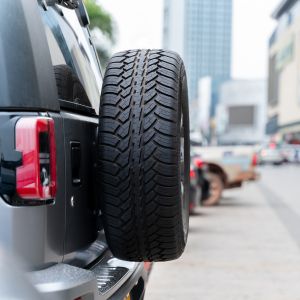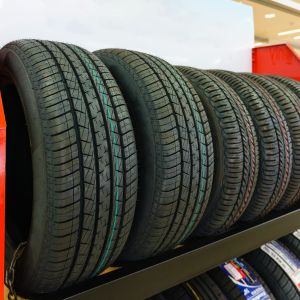A spare tyre should be kept in a cool, dry location away from direct sunshine, heat, and moisture for good storage. Before being stored, the tyre should be carefully cleaned, and it should be maintained at the recommended pressure.
In order to avoid any damage from exposure to the elements, it is advisable to store the tyre upright with the valve stem facing up and covered or bagged. The spare tyre needs to be kept safely in a designated location, such the trunk of your car or a special storage space, and it needs to be checked frequently for any symptoms of wear and tear, like bulges, cracks, or car punctures.
How to properly store a spare tyre?

Properly storing a spare tyre can help to extend its lifespan and ensure that it is ready to use when needed. Here are some steps to follow when storing a spare tyre:
- Before storing the spare tyre, thoroughly clean it with a mild detergent and water. This will clean the tyre of any accumulated dirt, grime, or other contaminants.
- Inspect the tyre: Examine the spare tyre carefully for any signs of damage, such as cuts, punctures, or uneven wear. If you notice any problems, replace the tyre rather than store it.
- Inflate the tyre: Ensure that the spare tyre is properly inflated to the recommended pressure, which can be found on the tyre’s sidewall or in the owner’s manual. Under-inflated tyres can become misshapen and dangerous to drive.
- Store the tyre in a cool, dry place: Tyres should be stored in a cool, dry place that is free of sunlight and other environmental factors. A garage or storage shed is an excellent choice. Avoid storing your spare tyre in your car’s trunk, as heat can cause the tyre to degrade faster.
- Store the tyre flat: It is best to store tyres flat in order to keep their shape and prevent warping.
- Using a protective cover: You can use a protective cover to provide your spare tyre an additional layer of defence. This can help keep it clean and shield it from UV radiation, moisture, and dust.
- Before utilising the spare tyre, make sure there are no leaks and that the pressure is correct.
Why is a spare tyre necessary?

Here are a few reasons why a spare tyre is necessary:
- Safety: By allowing you to continue driving even with a flat tyre, having a spare tyre can help to prevent accidents brought on by unexpected tyre failure.
- Convenience: Changing a flat tyre by the side of the road is inconvenient, time-consuming, and perhaps dangerous if you don’t have a spare tyre.
- Having a spare tyre on hand can provide drivers piece of mind, especially when they are travelling through isolated or hazardous locations.
- Cost-effective: The requirement for a tow truck or other means of transportation in the event of a flat tyre can be avoided by keeping a spare tyre on hand, which can result in long-term financial savings.
- Independent mobility: Having a spare tyre allows you to continue moving even if you have a flat tyre, as you can reach a safe location, repair station, or tyre shop.
A spare tyre should be the same size and type as the other tyres on your vehicle, and it should be in good condition. Before embarking on a long journey, check the condition of your spare tyre and ensure it is properly inflated.
Why plastic bag is used to store spare tyres?

While some experts recommend storing tyres in plastic bags to keep dust and other contaminants at bay, it is not required. Here are some of the reasons:
- Tyres are made of rubber, and since plastic bags may trap moisture, mould and mildew can grow on the tyres, which over time can cause the rubber to disintegrate.
- Plastic bags can trap heat. If the temperature inside the bag rises due to the use of plastic bags, the tyres will deteriorate more quickly.
- Plastic bags have the potential to physically harm the tyre’s surface, including causing scratches and other physical harm.
- A plastic bag is not necessary if the tyres are stored in a clean, dry environment because they won’t be exposed to dust or other impurities.
It is critical to store the tyres in a climate-controlled environment that is free of sunlight and other environmental factors. A garage or storage shed is an excellent choice. Avoid storing your spare tyre in your car’s trunk, as heat can cause the tyre to degrade faster.
Is it bad to store tyres on concrete?
It’s generally not advised to store tyres on concrete because it can harm their condition. Tires kept on concrete can pick up moisture from the ground since concrete is a porous material that can absorb moisture; this can cause damage over time.
The rubber of tyres that are kept on concrete may expand and contract as a result of exposure to temperature variations. As a result, the tyre may become weaker and have a shorter lifespan due to cracks and other types of damage. Additionally, concrete can be abrasive, and over time, the tyres may accumulate microscopic concrete particles that wear them down.
It is advised to keep your tyres on a spotless, dry surface that is not porous to reduce the risk of damage. Tires can be kept, for instance, on a pallet or a piece of cardboard. This will shield the tyres from abrasive particles and help stop moisture from penetrating into them. Additionally, you should store your tyres out of the sun’s direct rays and other heat sources because too much heat might harm the rubber.
In conclusion, even if it might be practical to store tyres on concrete, it is not advisable owing to the risk of damage from exposure to moisture and temperature changes. Store your tyres away from direct sunlight and heat sources on a clean, dry surface that is not porous in order to assist maintain the condition of your tyres.
Frequently Asked Questions
Q1. Is it better to store tyres flat or upright?
Ans: Generally speaking, it is advisable to store tyres flat because doing so helps to keep their shape and prevent warping.
Q2. How long can tyres sit unused?
Ans: Tyres should only be left unused for a maximum of six years before the rubber begins to deteriorate and the tyre becomes dangerous to use.
Q3. Is it bad to store tyres wet?
Ans: Storing wet tyres is bad because it encourages the growth of mould and mildew on the tyres as well as corrosion on the rims.
Q4. Should tyres be stored in plastic bags?
Ans: Some experts suggest placing tyres in plastic bags to keep them free of dust and other pollutants, but it’s not always a good idea.
Q5. Is it bad to store tyres on concrete?
Ans: Tyres can be kept on a concrete surface as long as the location has a suitable temperature and humidity level and they are protected from sunshine and other environmental factors.

